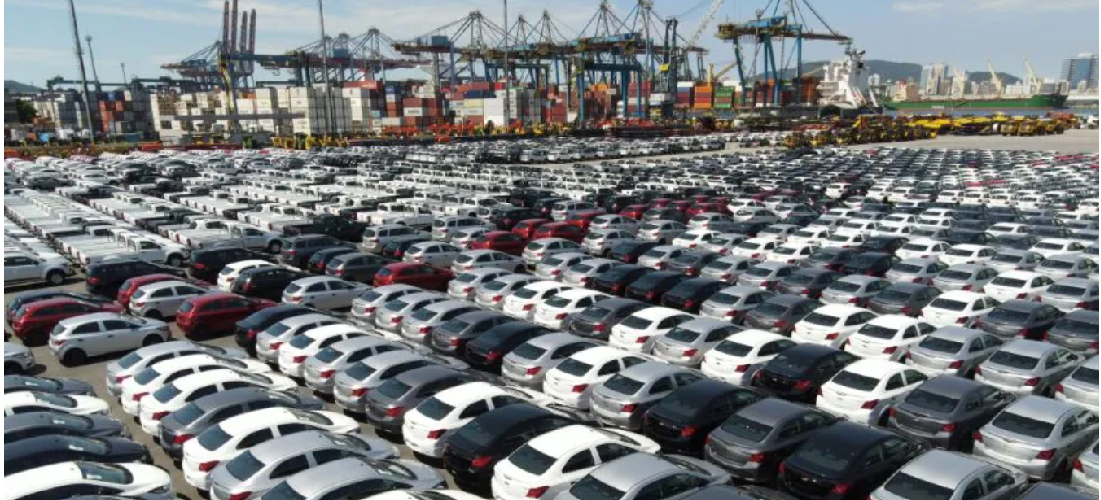
Port of Santos secures largest share of car exports in Brazil
Jul, 20, 2023 Posted by Gabriel MalheirosWeek 202330
The Port of Santos, an important economic hub in Brazil, has consistently set records for cargo handling year after year. The port is currently responsible for 54% of the country’s automobile exports to various continents, distributed between the Ecoporto terminal on the Right Bank and the Santos Brasil terminal on the Left Bank.
“Santos continues to hold the largest market share among Brazilian ports,” said Rafael Cristelo, general manager of K Line, a Japanese shipping company that operates over 600 ships worldwide, also the leader in Brazil in the maritime transport of vehicles.
The TEV terminal, operated by Santos Brasil, is the largest vehicle terminal in the country, with an operational capacity of 300,000 vehicles per year. It accounts for about 90% of the cargo throughput at Santos Port.
In the first quarter of 2023, the Santos Brasil vehicle terminal handled 55,358 vehicles, an increase of 1.9% over the previous year, with a focus on the export of 51,034 vehicles (+ 6.1% compared to the same period of 2022). Of the total handled in the period, 49,406 were light vehicles, and 5,952 were heavy vehicles. Data for the second quarter of 2023 will be released on August 8.
Santos Brasil closed 2022 with 281,014 vehicles, up from 201,457 in 2021 – a growth of 39.5%. Of the total vehicles handled last year, 250,759 were for export, and 30,255 were for import. In 2021, these numbers were 181,884 and 19,573, respectively. The Ecoporto terminal did not respond to a request for comment.
Projections
Despite the superlative numbers, the K Line general manager recalls that Santos Port recorded a 19% drop in exports in the first four months of the year. When comparing the January-April periods of 2022 and 2023, as reported by the Santos Port Authority (APS), the decline is immediately apparent: 72,093 vs. 68,598.
Anfavea projects that 467,000 vehicles will be exported by the country in 2023 – 439,000 light vehicles and 28,000 heavy vehicles. The total number represents a decline of 2.9% from 2022 when 481,000 vehicles were exported. Between January and June of this year, there were 227,200 vehicles exported compared to 246,300 in the same period of 2022 – a 7.7% decrease.
“The automotive market in Chile and Colombia is falling sharply. On the other hand, Mexico is buying much more from Brazil, which is causing congestion at Mexican ports,” Cristelo said. Renault, via Paranaguá in Paraná state, and Fiat, via Suape in Pernambuco state, represent this increase in demand from the North American country.
“Vehicle production is below the projected level for the year, which is a red flag for the sector. The scenario so far is one of observation of what is happening in the market. Brazil has lost factories and automakers, lost jobs in the sector, and its position as an exporter is also going through a delicate moment. This impacts the entire production and logistics chain of Brazilian exports, as well as the country’s trade balance,” said economist Denis Castro.
Source: A Tribuna
To read the original news report, see: https://www.atribuna.com.br/noticias/portomar/porto-de-santos-segue-com-maior-participacao-nas-exportacoes-de-automoveis-no-brasil
-
Shipping
Sep, 26, 2024
0
Argentina: Government Imposes 40.49% Hike on Paraguay-Paraná Waterway Toll
-
Meat
May, 09, 2022
0
Pig farming chain sees signs of a milder crisis ahead
-
Ports and Terminals
Nov, 25, 2024
0
Vila Velha Terminal Records 39% Increase in Operational Productivity After Modernizations
-
Grains
Jul, 01, 2021
0
Soybean exports from Brazil fall 12.7% in June and ore and oil advance

